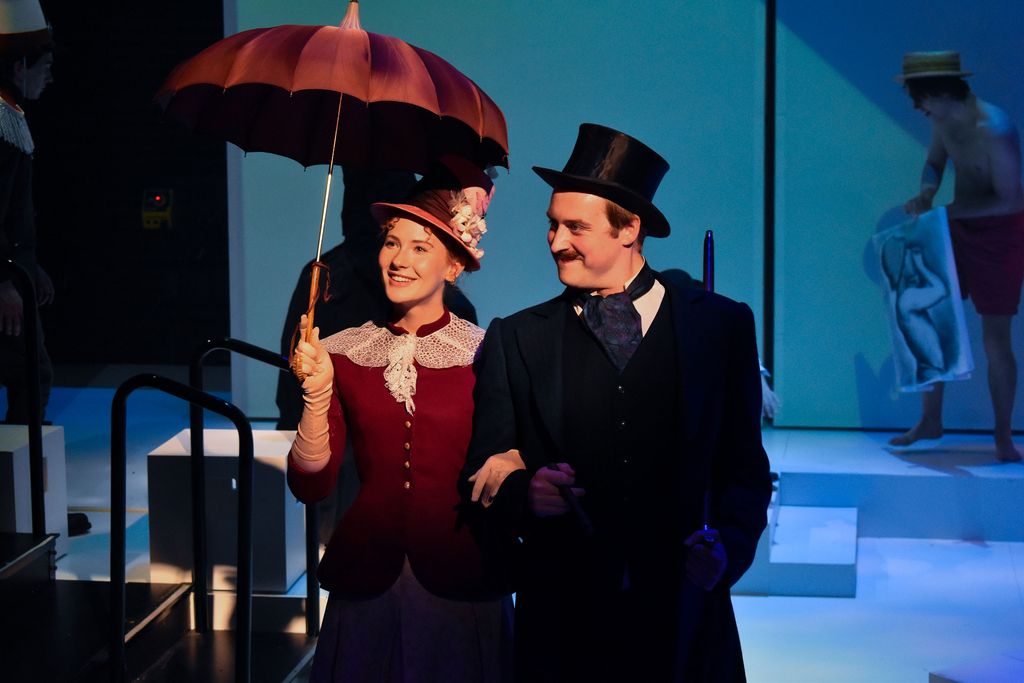Sunday in the Park with George Opens at Booth Theatre

Photos by Katie Nelson
Sunday in the Park with George Opens at Booth Theatre
CFA production of Stephen Sondheim’s Pulitzer-winning musical runs through Sunday
This article was originally published in BU Today on April 24, 2024. By Emily Wyrwa (COM’26)
When College of Fine Arts students Sarah Coleman and Keith Robinson were assigned to sing the duet “Move On,” one of the lead numbers from the musical Sunday in the Park with George, in their musical theater class last year, Coleman (CFA’24) was thrilled.
She has dreamed of playing Dot—the titular character’s love interest in the show—since her days as a teenage student at New Jersey’s Paper Mill Playhouse Summer Musical Theater Conservatory.
“When I was 15, there was an arrangement of ‘Putting It Together’ [at the conservatory recital]. When I heard that song, I was like, where is this from? and I fell in love with the Sunday in the Park with George album,” Coleman recalls.
This weekend, she will realize her dream when she and Robinson (CFA’24) star in the School of Theatre production of the renowned 1983 Stephen Sondheim/James Lapine musical. Directed by Clay Hopper (CFA’05), a CFA senior lecturer in directing, the show runs from April 25 to 28 at the Joan & Edgar Booth Theatre. The show is sold out, but names can be put on a waiting list at the door ahead of each performance.
Inspired by the famous painting A Sunday Afternoon on the Island of La Grande Jatte by French pointillist painter Georges Seurat, the first act follows George—a fictionalized version of Seurat—and his mistress, Dot, one of his models for painting, as he creates his famous masterpiece. George considers how his ambition and obsession with creating art impacts his personal relationships, especially with Dot. The second act, set in 1984, introduces the audience to George and Dot’s great-grandson—also named George and also an artist—who is grappling with similar themes.
“It is a breakdown of the entire artistic process and what it’s like to create art and then the impact that it generates on the world around us,” Robinson says.
Sunday in the Park with George is one of Sondheim’s most beloved musicals. The original production won the Pulitzer Prize for Drama in 1985, and the show has had three acclaimed Broadway revivals in the intervening decades. Hopper says that when he told people he was directing Sunday in the Park with George, he was suddenly given mountains of material to read.

Arabella Benjamin (CFA’25) plays Yvonne and Liam McCarron (CFA’24) is Jules in CFA’s production of Sunday in the Park with George.
On the coffee table in his CFA office sits Lapine’s book Putting It Together, which chronicles his and Sondheim’s two-year journey creating the show. Hopper says he was constantly being asked how he would create “the tree, the dress, the three quarter thrust” stage structure. At a certain point, he had to stop reading, take a step back, and trust in the words and music.
“The play began to speak to me once I stopped listening to people talk about it,” Hopper says. “It began to say to me that the play is really making an argument for the reassertion of humanity as the center of art’s reason for being. When I realized that, it all just opened up and the design opened up and all the questions began to answer themselves.”
Hopper and longtime collaborator, set designer Cristina Todesco (CFA’94), sat down to answer some of those questions with paper-and-pencil sketches of how they could use the Booth Theatre.
“The play itself is very much about the conventions of design and how artists stretch and break through and reinvent and redefine all the things that they know about the art form,” Todesco says. “I think identifying what the conventions are is really important as an artist and even in this play, like the conventions of the seating arrangement, and how can we push that envelope? How can we stretch the parameters of those conventions?”
It is also the first time in several years that the School of Theatre has produced a mainstage musical, something Hopper believes is an essential part of an actor’s education. And what better musical to introduce young actors to than Sondheim’s masterpiece?